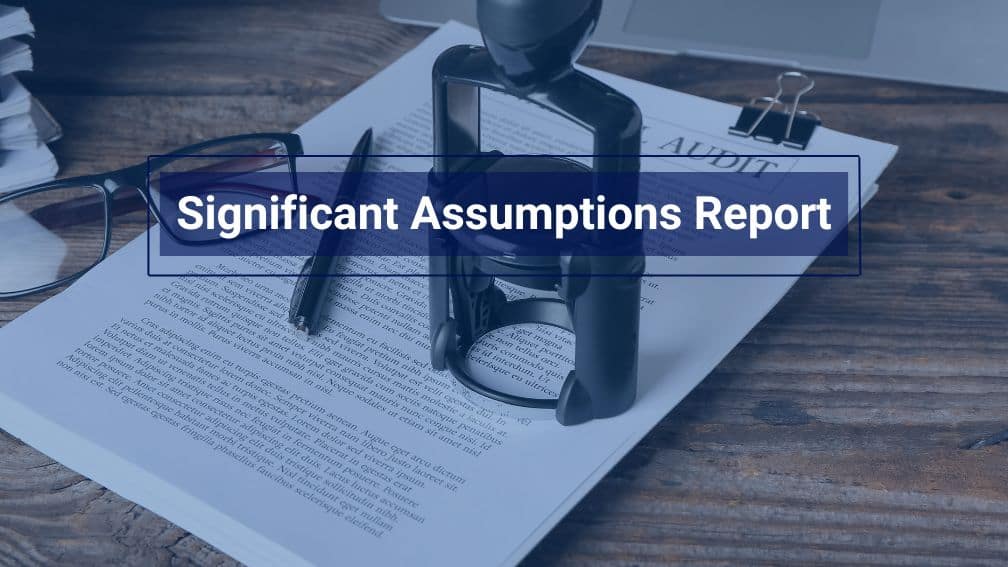What is a Significant Assumptions Report
Last Updated on February 28, 2024 by Morgan Beard
The lease accounting process is a complex area requiring meticulous attention to detail and comprehensive documentation. This is where the need for a Significant Assumptions Report (SAR) becomes evident. Aimed at enhancing clarity and simplifying the audit process, a SAR serves as a cornerstone document, detailing all assumptions used in the lease accounting process. Let’s explore why accounting teams should prioritize creating this report.
Centralization of Critical Data
The lease accounting process involves numerous variables, from possession dates to discount rates, each playing a crucial role in the accurate representation of lease obligations on financial statements. A SAR centralizes this critical data, offering a single, comprehensive file that outlines every assumption made during the lease accounting process. This centralization is not just a matter of convenience; it’s a strategic tool that facilitates better oversight, consistency, and accuracy in financial reporting.
Streamlining the Audit Process
Audits are an integral part of financial compliance, ensuring that an organization’s financial statements accurately reflect its financial position. However, audits can be time-consuming and resource-intensive. A SAR significantly streamlines the audit process by providing auditors with a clear, detailed overview of the assumptions underlying the lease accounting entries. This transparency enables auditors to efficiently assess the accuracy and compliance of the lease accounting process, reducing the time and effort required for audit completion.
Enhancing Communication with Auditors
Effective communication with auditors is pivotal to a smooth audit process. A SAR serves as a focal point for discussions, enabling accounting teams to clearly present and justify the assumptions made during the lease accounting process. This proactive approach to communication not only facilitates a more efficient audit but also minimizes the risk of misunderstandings and potential discrepancies, leading to a smoother, more collaborative relationship between the organization and its auditors.
Supporting Compliance and Reducing Risk
The introduction of standards like ASC 842 and IFRS 16 has brought significant changes to lease accounting, emphasizing the need for greater transparency and detailed disclosure of leasing activities. A SAR supports compliance with these standards by ensuring that all relevant assumptions and calculations are documented and readily available for review. This comprehensive documentation reduces the risk of non-compliance and the associated financial penalties, enhancing the organization’s reputation and stakeholder confidence.
Key Components of a Significant Assumptions Report
A well-structured SAR should include, but not be limited to, the following information:
- Possession Date and Expiration Date: The start and end dates of the lease, defining the lease term.
- Classification: Classification of the lease as either a finance lease or an operating lease, based on criteria set forth by relevant accounting standards.
- Discount Rate: The interest rate used to discount lease payments, reflecting the cost of borrowing.
- Initial Direct Costs: Any direct costs incurred by the lessee at the inception of the lease.
- Incentives: Consideration of any lease incentives, such as reimbursement of leasehold improvements.
- Impairments: Summary of any impairment losses related to the right-of-use asset.
- Financial Instruments: Details on any financial instruments or arrangements related to the lease.
- Assets: Identification and valuation of assets associated with the lease.
- Fair Value Measurements: Methodology used to determine fair values of assets and liabilities.
- Cash Flow Model: Projected cash flows related to the lease.
- Valuation Model: Description of valuation models used for asset and liability measurement.
- Market Conditions: Assessment of current and expected market conditions relevant to the lease.
- Financial Conditions: Evaluation of financial health and ability to meet obligations.
- Comprehensive Income: Impact of the lease on comprehensive income.
- Economic Conditions: Analysis of prevailing and anticipated economic factors.
- Risk Assessment: Discussion of risks and uncertainties associated with assumptions.
- Accounting Principles: Note on applicable accounting principles and standards followed.
- Historical Performance: Consideration of historical performance as it relates to assumptions.
- Future Performance: Expectations for future financial performance tied to the lease.
The Importance of a Significant Assumptions Report
The importance of a Significant Assumptions Report in the lease accounting process cannot be overstated. It centralizes critical data, streamlines the audit process, enhances communication with auditors, and supports compliance while reducing risk.
Additionally, the SAR provides an overview of the key judgements and estimates made by management. By summarizing the rationale behind assumptions, it allows stakeholders to better evaluate the company’s decision-making process. The report facilitates transparency around potential risks, increasing confidence in the reliability of financial statements.
Finally, the SAR acts as a resource for the organization itself. It documents institutional knowledge and ensures a consistent, compliant approach to lease accounting from year to year. As regulations and business conditions evolve, the SAR creates an audit trail that explains changes in methodology over time. For all these reasons, companies should invest the time and effort into creating a rigorous, comprehensive Significant Assumptions Report.
